Hi, there today we are discussing on Enable or Disable Efficiency Mode Policy in MS Edge Browser using M365 Admin Center. As you all know that a browser performance is well needed one and its always depend on the Resorces of a browser.
In that case efficiency mode takes a big role in the browser. Efficiency mode has a crucial role in our device running smoothly when it has low energy. It works by cutting down on unnecessary background activity, controlling how much power the processor uses.
This is especially useful for laptops, tablets, and other portable gadgets etc. In Microsoft Edge, it works by reducing background activity and limiting resource heavy tasks, which helps extend battery life and improve performance. The main advantages of the settings are Users and administrators can customize how Efficiency Mode operates.
It can turn on automatically when your device is running on battery, or you can manually adjust the settings based on your needs. Laptops and tablets that depend on battery power. By decreasing unnecessary activities, Edge runs more smoothly while also saving energy.
Table of Contents
What Happens If this Policy is Not Configured?
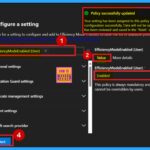
If not configured, the default efficiency mode is turned on for devices that have a battery, and off for devices that do not. In this case, users still can choose their preferred efficiency mode option manually by going to edge://settings/system in Microsoft Edge.
Enable or Disable Efficiency Mode Policy in MS Edge Browser
Above we discussed a lot of things about Enable or Disable Efficiency Mode Enabled Policy in MS Edge Browser using M365 Admin Center. Users and administrators can customize how Efficiency Mode operates. It can turn on automatically when your device is running on battery now, we have to look at how this policy is enabled through Microsoft Edge 365.
- You should first login to Microsoft 365 Admin Center.
- Click Settings.
- Select Microsoft Edge from the dropdown arrow.
- Select Configuration Policies.
- Click on + Create Policy.
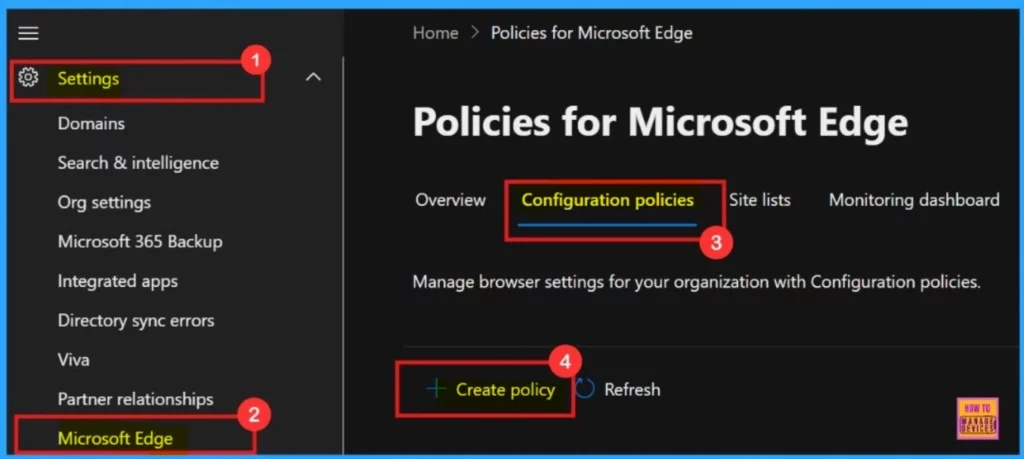
- New 22H2 Windows 11 Task Manager Features Efficiency Mode | Full Overview
- Improve Windows PC Performance by using New Efficiency Mode
- How to Check and Manage Enhanced Security Mode for a Site in MS Edge Browser
Basics
Basics is the first step you have to complete. In the Basics section, you need to provide the details of the policy. You must enter the policy name, description, policy type, and platforms. The policy type and platforms are already available; you only need to specify the policy name and description to help you identify the policy later. Once done, click “Next.”
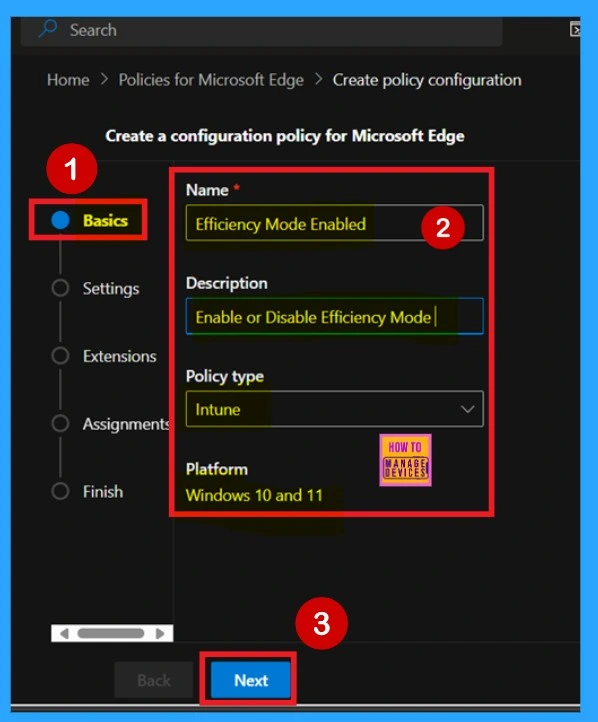
Settings
After completing the Basics section, the next step is Settings. In this section, you need to add settings to the policy. You will see an Add Setting option. Click on “Add Setting” and the Settings Policy page will open.
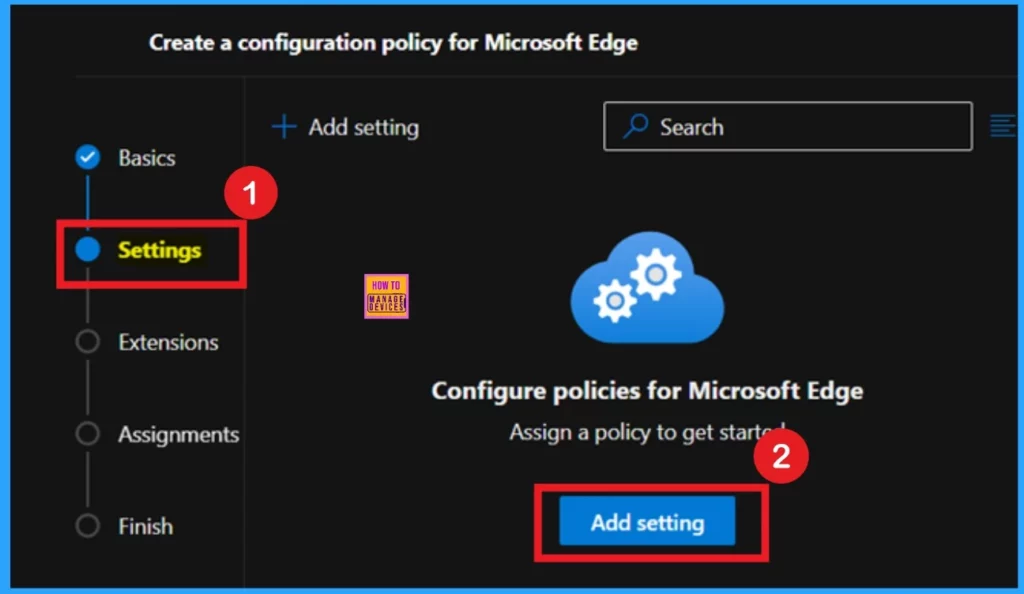
When the Settings page opens, you need to search for the policy name. You can either use the search bar or browse through categories such as Additional Settings, Application Guard Settings, etc. In my case, I searched for the policy name, and when I found it, I saw that the policy settings were available under the Value tab.
There, you will find options to enable or disable the policy. I selected the “Enabled” option because I wanted to enable the efficiency mode in the Edge. After selecting “Enabled,” I clicked “Select,” and you will be notified that the policy has been successfully updated.
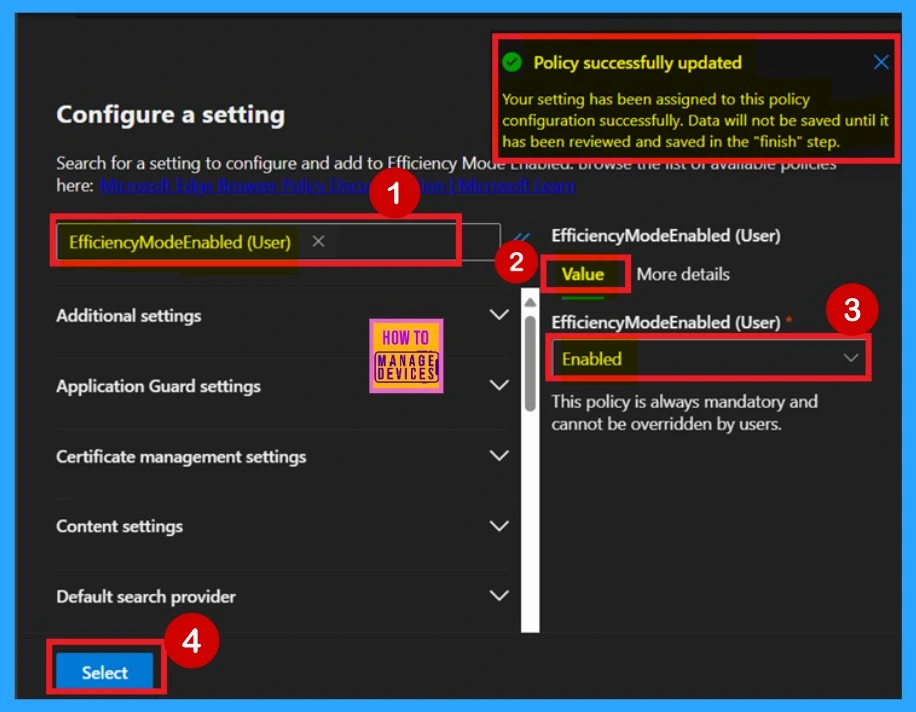
More Details
After the Value tab, you will see the “More Details” option. Please do not skip this section, as it provides important information about the policy. Microsoft Edge offers detailed explanations about the policy in this tab. It will remind you what happens if the policy is enabled, disabled, or not configured.
- When you deploy the policy, it is essential to be aware of these More details to ensure proper implementation.
| Enabled | Disabled | Not Configured |
|---|---|---|
| If you enable this policy, efficiency mode will become active according to the setting chosen by the user. You can configure the efficiency mode setting using the “EfficiencyMode” policy. If the device does not have a battery, efficiency mode will always be active. | If you disable this policy, efficiency mode will never become active. The “EfficiencyMode” and “EfficiencyModeOnPowerEnabled” policies will have no effect. | If you don’t configure this policy, efficiency mode will be enabled for devices with a battery and disabled otherwise. Users can choose the efficiency mode option they want in edge://settings/system. |
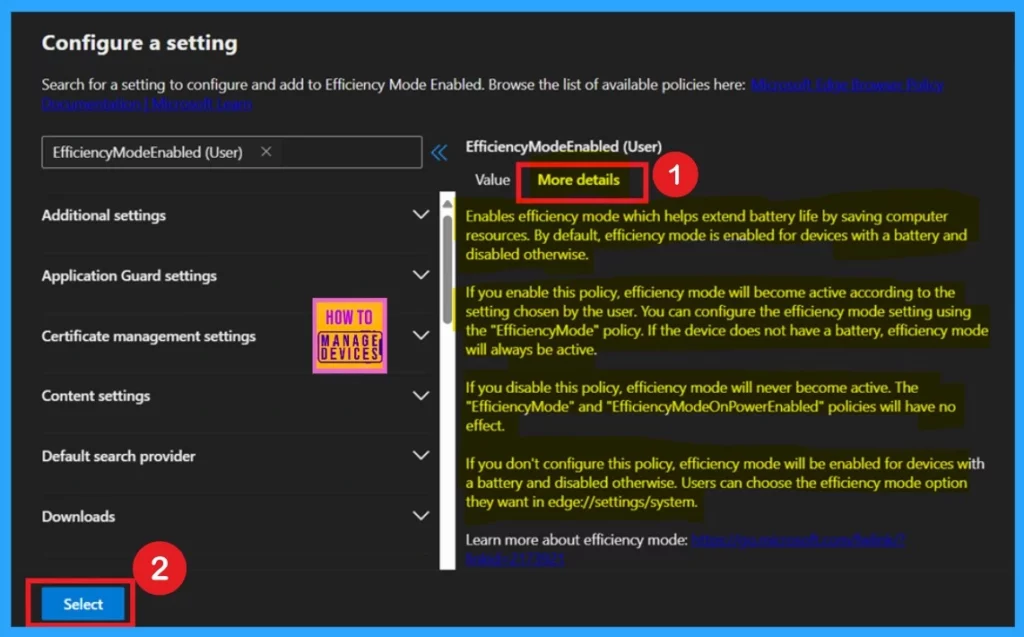
Extensions
The Extensions section lets us customize our policy by adding specific extensions, including settings for installation, permissions, and URLs. If we need more features, just click + Add extension to include them. But if we don’t need any extensions, we can just skip this section.
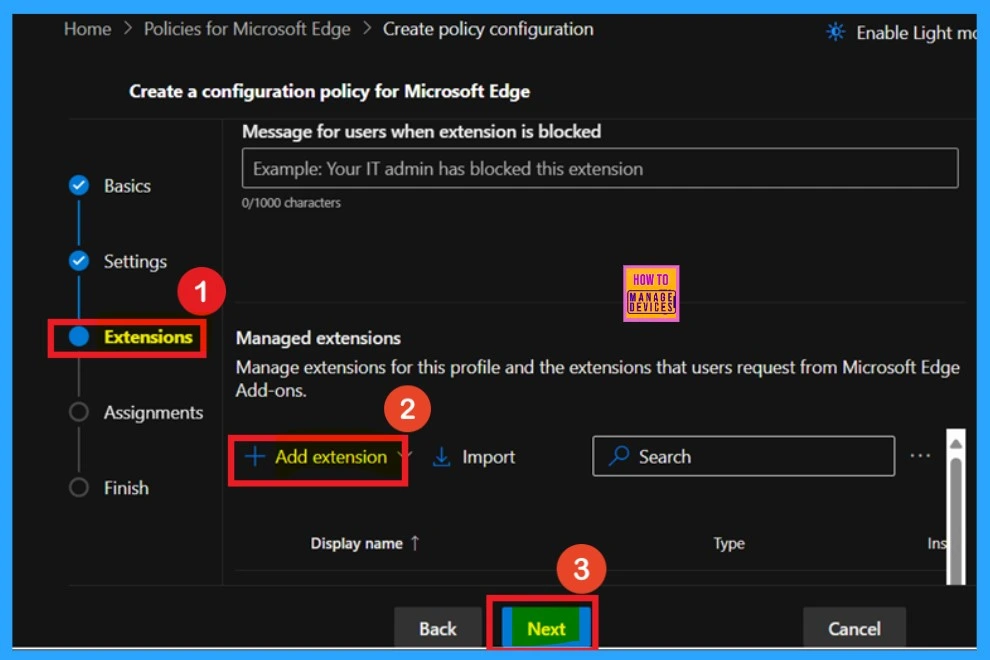
Assignments
In the Assignments , we choose which groups get this policy. Click Select group and pick from the available Microsoft Entra groups to decide who it applies to. Here, I select Test_HTMD_Policy as a group and then, click Select to continue.
When we pick a group, we will see a message confirming it’s been assigned. For example, the group Test_HTMD_Policy is now assigned, and it’s described as Groups have been updated. Data will not be saved until it has been reviewed and saved in the “finish” step.
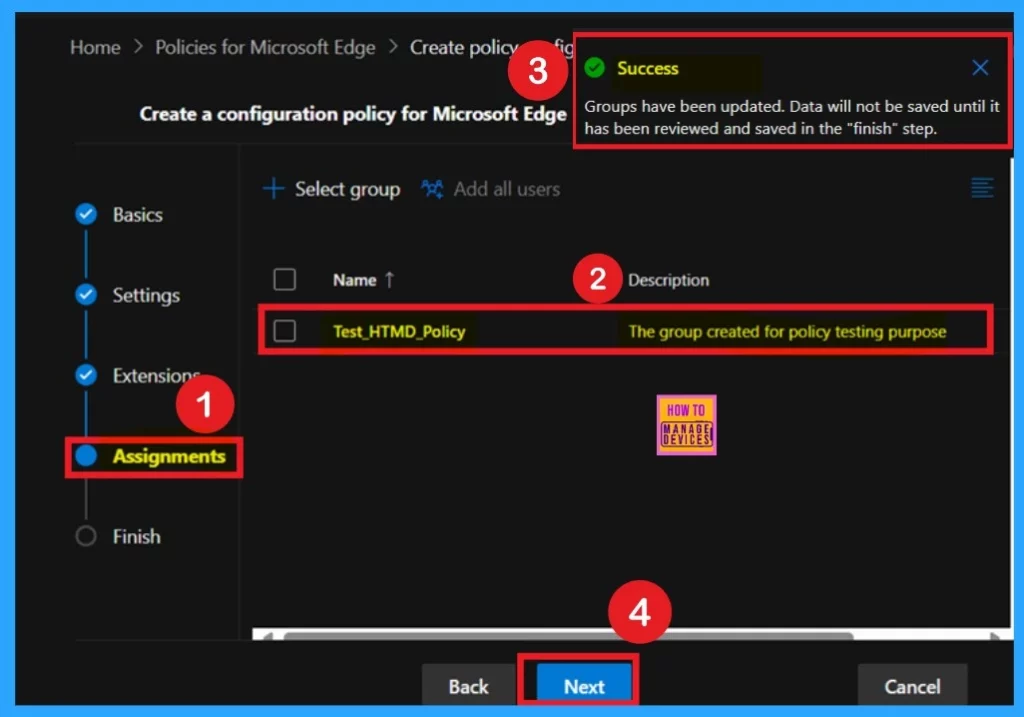
Finish
The final step is the “Finish” stage. Here, you can review all the details you have added to the policy, such as basic details, settings, and assignment information. You don’t need to do anything on this step unless you want to make changes.
If you need to edit something, go back to the previous steps and make the necessary changes. If everything looks good, click on the “Review and Create” option. The policy will then be created
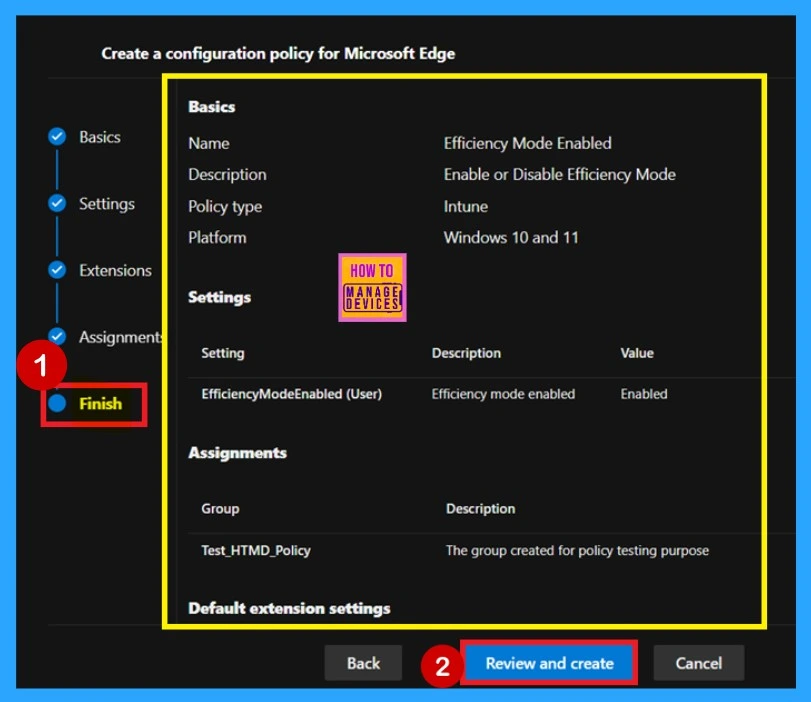
Monitoring Status
When a policy created it take 8 minimum waiting period. You can reduce the waiting period by manually syncing. After manually syncing the device through the Company Portal, you can verify the policy deployment in the Intune Portal. Navigate to Devices > Configuration, then open the Policies tab to locate the policy. A status of “Successful” confirms that the policy has been correctly applied to the device.
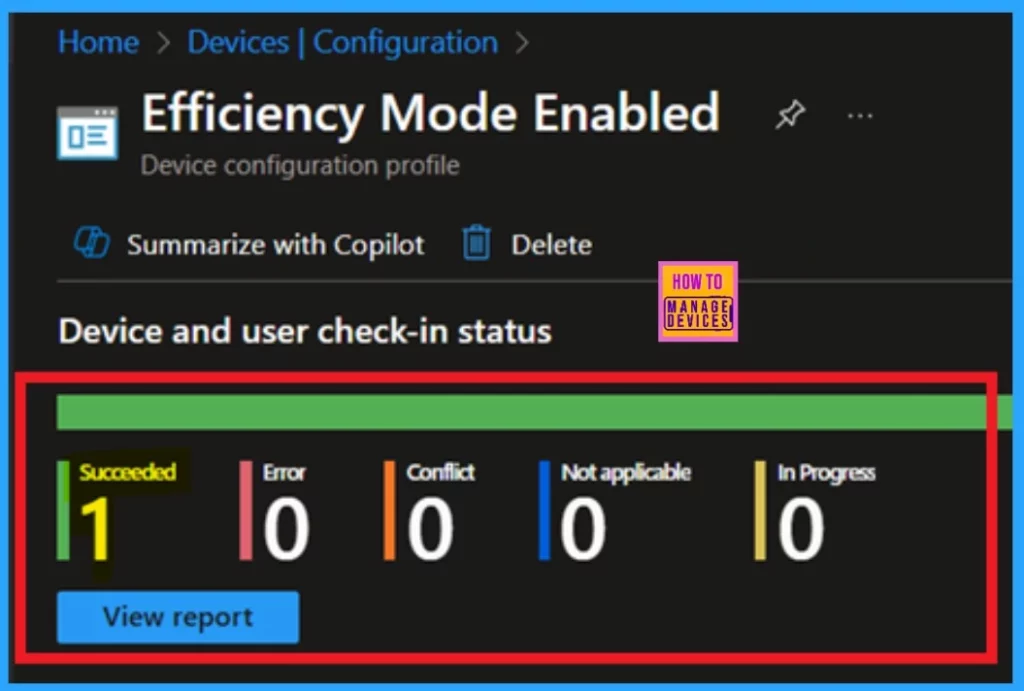
Client -Side Verification
If you confirm the Monitoring status you can also check the event viewer. Administrators can check policy status on individual devices using Windows Event Viewer. To verify client-side compliance, go to Applications and Services Logs > Microsoft > Windows > DeviceManagement-Enterprise-Diagnostics-Provider > Admin, and then filter for Event ID 814.
| Policy Details |
|---|
| MDM PolicyManager: Set policy string, Policy: (EfficiencyModeEnabled), Area: (microsoft_edgev106~Policy~microsoft_edge~Performance), EnrollmentID requesting merge: (B1E9301C-8666-412A-BA2F-3BF8A55BFA62), Current User: (S-1-12-1-3449773194-1083384580- 749570698-1797466236), String: (), Enrollment Type: (0x6), Scope: (0x1). |
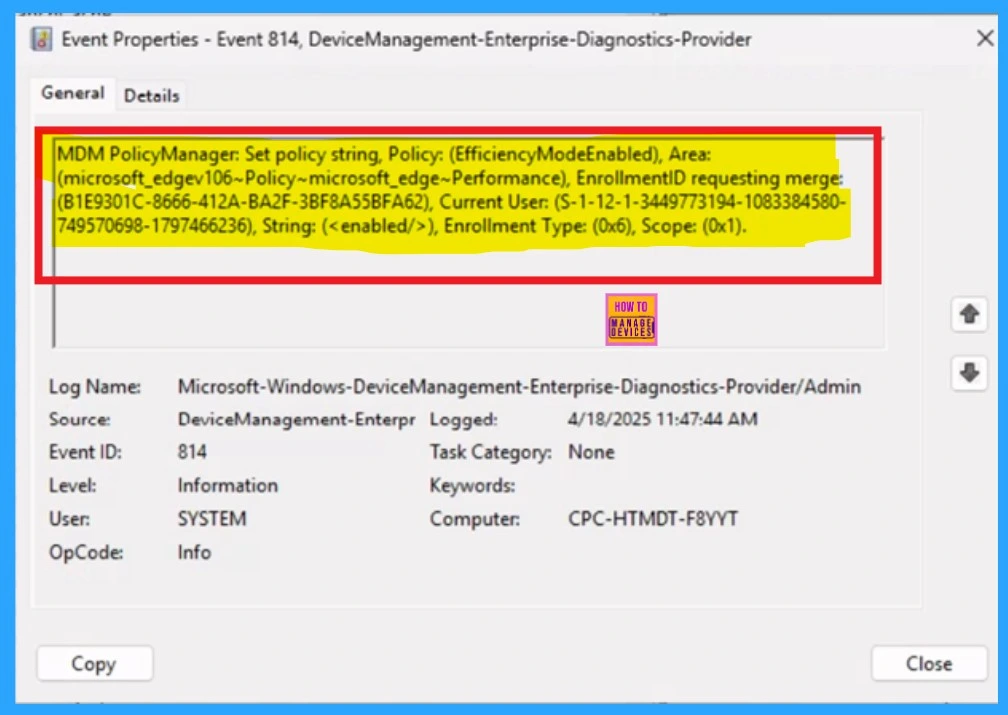
End User Experiance
After verifying the policy through monitoring status and client-side checks, you need to confirm whether the policy has been applied in Microsoft Edge settings. To do this, open Microsoft Edge and click on the 3-dot menu (More options). Then, select “Settings.”
- Go to Settings and type “Efficiency Mode” in the search bar.
- Navigate to System and Performance under the settings menu.
- Look for the Efficiency Mode toggle if it is turned on, the mode is enabled.

Need Further Assistance or Have Technical Questions?
Join the LinkedIn Page and Telegram group to get the latest step-by-step guides and news updates. Join our Meetup Page to participate in User group meetings. Also, Join the WhatsApp Community to get the latest news on Microsoft Technologies. We are there on Reddit as well.
Author
Anoop C Nair has been Microsoft MVP for 10 consecutive years from 2015 onwards. He is a Workplace Solution Architect with more than 22+ years of experience in Workplace technologies. He is a Blogger, Speaker, and Local User Group Community leader. His primary focus is on Device Management technologies like SCCM and Intune. He writes about technologies like Intune, SCCM, Windows, Cloud PC, Windows, Entra, Microsoft Security, Career, etc.
